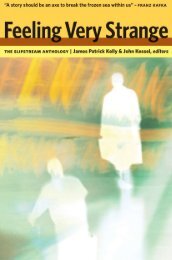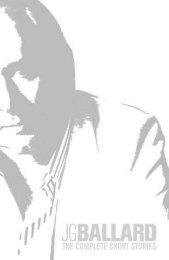The Curse of the Wer.. - Site de Thomas - Free
The Curse of the Wer.. - Site de Thomas - Free
The Curse of the Wer.. - Site de Thomas - Free
Create successful ePaper yourself
Turn your PDF publications into a flip-book with our unique Google optimized e-Paper software.
16 THE CURSE OF THE WEREWOLF<br />
he promoted a mo<strong>de</strong>l <strong>of</strong> authorship that differed from <strong>the</strong> mo<strong>de</strong>l that<br />
had predominated in <strong>the</strong> romantic period. Rejecting <strong>the</strong> extravagant<br />
language <strong>of</strong> romanticism, Ranke advocated <strong>the</strong> virtues <strong>of</strong> a less ornamental<br />
style <strong>of</strong> writing. In his view, authors should remain <strong>de</strong>tached<br />
from <strong>the</strong>ir subject matter, concerning <strong>the</strong>mselves only with <strong>the</strong> ‘strict<br />
presentation <strong>of</strong> <strong>the</strong> facts’. 15 Ranke’s claim that truth would emerge<br />
from <strong>the</strong> empirical presentation <strong>of</strong> facts was a second i<strong>de</strong>a that proved<br />
influential. For Ranke, ‘facts’ were to be found primarily in historical<br />
documents, and in this sense he resuscitated <strong>the</strong> value <strong>of</strong> <strong>the</strong> ‘books’<br />
that had been so roundly con<strong>de</strong>mned by Bor<strong>de</strong>lon and later by Jean-<br />
Jacques Rousseau. 16 His reverence for <strong>the</strong> historical text also had <strong>the</strong><br />
si<strong>de</strong> effect <strong>of</strong> bolstering <strong>the</strong> authority <strong>of</strong> contemporary authors, who<br />
enjoyed respect as <strong>the</strong> producers <strong>of</strong> such venerated cultural artefacts<br />
(in<strong>de</strong>ed, as Edward Said pointed out, ‘<strong>the</strong> word author itself springs<br />
from <strong>the</strong> same etymological roots as authority’). 17 Third, Ranke sought<br />
to apply <strong>the</strong> methods <strong>of</strong> science to his work, an approach that was<br />
wi<strong>de</strong>ly adopted by historians and o<strong>the</strong>r social commentators. Scholarship<br />
was increasingly evaluated in terms <strong>of</strong> its ‘scientific’ credibility<br />
as <strong>the</strong> century wore on.<br />
Over <strong>the</strong> course <strong>of</strong> <strong>the</strong> century, all <strong>the</strong>se attitu<strong>de</strong>s were brought to<br />
bear upon literature exploring <strong>the</strong> <strong>the</strong>me <strong>of</strong> lycanthropy. In<strong>de</strong>ed, by<br />
combining respect for documentary evi<strong>de</strong>nce with a scientific ethos,<br />
Ranke had posed a peculiar problem for nineteenth-century scholars<br />
<strong>of</strong> <strong>the</strong> occult. While <strong>the</strong> reality <strong>of</strong> lycanthropy was <strong>de</strong>fen<strong>de</strong>d in several<br />
accounts dating from <strong>the</strong> medieval and early mo<strong>de</strong>rn periods, <strong>the</strong><br />
nineteenth-century un<strong>de</strong>rstanding <strong>of</strong> biology and physics preclu<strong>de</strong>d <strong>the</strong><br />
possibility that <strong>the</strong> transformation <strong>of</strong> a human into a wolf was possible.<br />
Consequently, many writers <strong>de</strong>ci<strong>de</strong>d that such texts must hold a grain<br />
<strong>of</strong> truth, and that <strong>the</strong>ir task was to discover what that truth might be.<br />
In o<strong>the</strong>r words, <strong>the</strong>y set out to provi<strong>de</strong> a rational explanation for <strong>the</strong><br />
phenomenon. By 1865, this attitu<strong>de</strong> was articulated clearly by Sabine<br />
Baring-Gould in <strong>the</strong> preface to his <strong>The</strong> Book <strong>of</strong> <strong>Wer</strong>e-wolves: Being An<br />
Account <strong>of</strong> a Terrible Superstition, in which he wrote ‘When a form <strong>of</strong><br />
superstition is prevalent everywhere, and in all ages, it must rest upon<br />
a foundation <strong>of</strong> fact; what that foundation actually is, I have, I hope,





